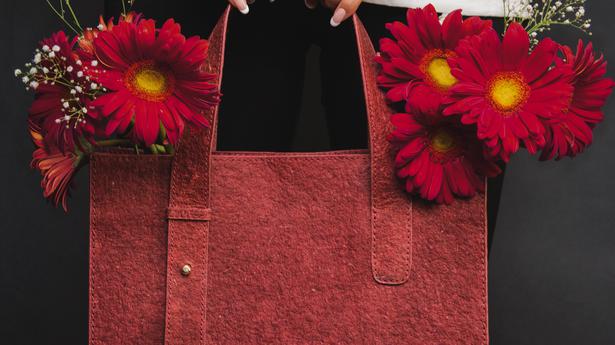
When coconuts turn couture: on Waraq’s madder-embroidered bags crafted with coconut leather
The Hindu
The latest brand to hop on to the coconut leather bandwagon is Waraq, with madder-embroidered bags and keychains
After managing luxury brands for several years, New Delhi-based Isha C and Alok Dhodapkar wanted to venture into something drastically different from what they had done before. “We wanted a creative outlet,” says Alok, adding how they spent the lockdown years on research before zeroing in on coconut leather.
While vegan alternatives to leather have been around for a few years, the segment continues to be a niche market in India. Pineapple, cacti, cork, apple… the list of natural substitutes to leather being explored keeps increasing. With the launch of Alok and Isha’s Waraq, coconut seems to be leading the way among vegan alternatives among Indian brands.
Named after the traditional fine sheet of gold and silver used to decorate sweets and food, Waraq was officially launched earlier this month with a limited-edition range of bags, wallets and accessories including key chains and bookmarks. Taking us through their first collection, The Rubia, Alok says it is an ode to ‘Rubiaceae’, the plant that lends the opulent dye of pre-historic times — madder. “We wanted to bring the old-world colour palette to the modern world. Rubia features products with the classic red colour, embroidered interior, contrasted with gold colour hardware, on a luxurious slightly textured coconut biomaterial,” he says.
“There is no such thing as vegan leather. There are, however, vegan biomaterials.,” says Alok. “Leather, by definition, is anything made from the skin of an animal by tanning or a similar process. Vegan leather seen in the fashion circuit is nothing but polyurethane (PU), belonging to the family of plastics. Conversely, vegan biomaterial is made from natural materials such as coconut, other fruit waste, etc,” he says.
The coconut biomaterial sourced by Waraq is crafted from organic and sustainable bacterial cellulose, grown on agricultural waste sourced from Kerala. And putting things in place took them time. “We spent almost two years researching vegan biomaterials, and then identifying a seasoned manufacturer who could work around innovative materials,” says Alok, adding how it was a challenge finding suitable artisans, before identifying craftspeople in Kutch, Bareilly, smaller cities in Uttarakhand and Bihar, and small communities in Delhi.
They say it took time to understand the material, its changing behaviour while undergoing the manufacturing process, and how it worked with the lining. “It took time, but it happened!” says Alok, who sees a gradual transition in consumer behaviour. “From being aware about vegan options, people are now actively looking for them. Waraq is not trying to give you an alternative to a regular shopper’s bag, but a quality piece of art with a story attached to it.” This , they say, justifies their high price point (The mini tote costs ₹38,500).
The lining of products in Rubia feature intricate embroidered jaal work of the flower of the madder plant, done on madder-dyed, relaxed handwoven cotton. The duo says the madder flower, unlike the root which is intense, woody, and extremely pigmented , is petite and delicate in form and only blooms in summer.











